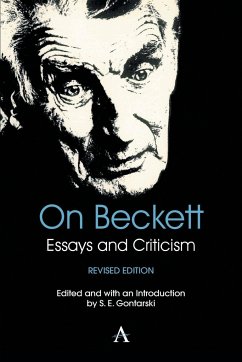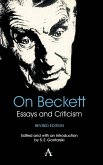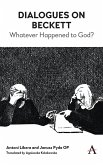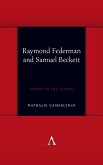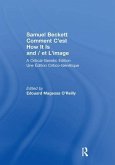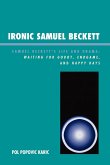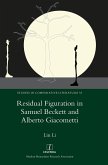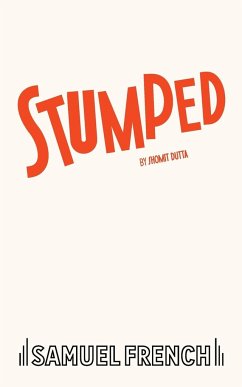On Beckett
Essays and Criticism
Herausgeber: Gontarski, S. E.
On Beckett
Essays and Criticism
Herausgeber: Gontarski, S. E.
- Broschiertes Buch
- Merkliste
- Auf die Merkliste
- Bewerten Bewerten
- Teilen
- Produkt teilen
- Produkterinnerung
- Produkterinnerung
"On Beckett: Essays and Criticism" is the first collection of writings about the Nobel Prize-winning author that covers the entire spectrum of his work, and also affords a rare glimpse of the private Beckett.
Andere Kunden interessierten sich auch für
![On Beckett On Beckett]() On Beckett110,99 €
On Beckett110,99 €![Dialogues on Beckett Dialogues on Beckett]() Antoni LiberaDialogues on Beckett126,99 €
Antoni LiberaDialogues on Beckett126,99 €![Raymond Federman and Samuel Beckett Raymond Federman and Samuel Beckett]() Nathalie CamerlynckRaymond Federman and Samuel Beckett134,99 €
Nathalie CamerlynckRaymond Federman and Samuel Beckett134,99 €![Samuel Beckett Comment C'est How It Is And / et L'image Samuel Beckett Comment C'est How It Is And / et L'image]() Samuel BeckettSamuel Beckett Comment C'est How It Is And / et L'image67,99 €
Samuel BeckettSamuel Beckett Comment C'est How It Is And / et L'image67,99 €![Ironic Samuel Beckett Ironic Samuel Beckett]() Pol Popovic KaricIronic Samuel Beckett51,99 €
Pol Popovic KaricIronic Samuel Beckett51,99 €![Residual Figuration in Samuel Beckett and Alberto Giacometti Residual Figuration in Samuel Beckett and Alberto Giacometti]() Li LinResidual Figuration in Samuel Beckett and Alberto Giacometti106,99 €
Li LinResidual Figuration in Samuel Beckett and Alberto Giacometti106,99 €![Stumped Stumped]() Shomit DuttaStumped18,99 €
Shomit DuttaStumped18,99 €-
-
-
"On Beckett: Essays and Criticism" is the first collection of writings about the Nobel Prize-winning author that covers the entire spectrum of his work, and also affords a rare glimpse of the private Beckett.
Hinweis: Dieser Artikel kann nur an eine deutsche Lieferadresse ausgeliefert werden.
Hinweis: Dieser Artikel kann nur an eine deutsche Lieferadresse ausgeliefert werden.
Produktdetails
- Produktdetails
- Verlag: Anthem Press
- Seitenzahl: 352
- Erscheinungstermin: 15. Januar 2014
- Englisch
- Abmessung: 229mm x 152mm x 21mm
- Gewicht: 572g
- ISBN-13: 9781783081547
- ISBN-10: 1783081546
- Artikelnr.: 40083735
- Herstellerkennzeichnung
- Libri GmbH
- Europaallee 1
- 36244 Bad Hersfeld
- gpsr@libri.de
- Verlag: Anthem Press
- Seitenzahl: 352
- Erscheinungstermin: 15. Januar 2014
- Englisch
- Abmessung: 229mm x 152mm x 21mm
- Gewicht: 572g
- ISBN-13: 9781783081547
- ISBN-10: 1783081546
- Artikelnr.: 40083735
- Herstellerkennzeichnung
- Libri GmbH
- Europaallee 1
- 36244 Bad Hersfeld
- gpsr@libri.de
Edited with an Introduction by S. E. Gontarski
The Essential Beckett: A Preface to the Second Edition – S. E. Gontarski
A Beckett Chronology
Acknowledgments
Crritics and Crriticism: “Getting Known”– introduction by S. E. Gontarski
PRELIMINARIES: Beckett and “Merlin” – Richard W. Seaver
Samuel Beckett and the Visual Arts: The Embarrassment of Allegory – Dougald McMillan
When is the End Not the End? The Idea of Fiction in Beckett – Wolfgang Iser
THE PAGE: “Murphy” and the Uses of Repetition – Rubin Rabinovitz
“Watt” – Lawrence E. Harvey
“Mercier and Camier”: Narration, Dante, and the Couple – Eric P. Levy
Molloy’s Silence – Georges Bataille
Where Now? Who Now? – Maurice Blanchot
The Voice and Its Words: “How It Is”– J. E. Dearlove
The Unnamable’s First Voice? – Chris Ackerley
Between Verse and Prose: Beckett and the New Poetry – Marjorie Perloff
“Worstward Ho” – Dougald McMillan
THE STAGE: MacGowran on Beckett – interview by Richard Toscan
Blin on Beckett – interview by Tom Bishop
Working with Beckett – Alan Schneider
Notes from the Underground: “Waiting for Godot” and “Endgame” – Herbert Blau
Beckett Directs “Godot” – Walter D. Asmus
Beckett Directs: “Endgame” and “Krapp’s Last Tape” – Ruby Cohn
Literary Allusions in “Happy Days” – S. E. Gontarski
Counterpoint, Absence, and the Medium in Beckett’s “Not I” – Paul Lawley
Rehearsal Notes for the German Premiere of Beckett’s “That Time” and “Footfalls” – Walter D. Asmus
“Footfalls” – James Knowlson
Samuel Beckett and the Art of Radio – Martin Esslin
Light, Sound, Movement, and Action in Beckett’s “Rockaby” – Enoch Brater
Beckett’s “Ohio Impromptu”: A View from the Isle of Swans – Pierre Astier
“Quad” and “Catastrophe” – S. E. Gontarski
CODA: Burroughs with Beckett in Berlin – edited by Victor Bockris
Notes on Contributors
A Beckett Chronology
Acknowledgments
Crritics and Crriticism: “Getting Known”– introduction by S. E. Gontarski
PRELIMINARIES: Beckett and “Merlin” – Richard W. Seaver
Samuel Beckett and the Visual Arts: The Embarrassment of Allegory – Dougald McMillan
When is the End Not the End? The Idea of Fiction in Beckett – Wolfgang Iser
THE PAGE: “Murphy” and the Uses of Repetition – Rubin Rabinovitz
“Watt” – Lawrence E. Harvey
“Mercier and Camier”: Narration, Dante, and the Couple – Eric P. Levy
Molloy’s Silence – Georges Bataille
Where Now? Who Now? – Maurice Blanchot
The Voice and Its Words: “How It Is”– J. E. Dearlove
The Unnamable’s First Voice? – Chris Ackerley
Between Verse and Prose: Beckett and the New Poetry – Marjorie Perloff
“Worstward Ho” – Dougald McMillan
THE STAGE: MacGowran on Beckett – interview by Richard Toscan
Blin on Beckett – interview by Tom Bishop
Working with Beckett – Alan Schneider
Notes from the Underground: “Waiting for Godot” and “Endgame” – Herbert Blau
Beckett Directs “Godot” – Walter D. Asmus
Beckett Directs: “Endgame” and “Krapp’s Last Tape” – Ruby Cohn
Literary Allusions in “Happy Days” – S. E. Gontarski
Counterpoint, Absence, and the Medium in Beckett’s “Not I” – Paul Lawley
Rehearsal Notes for the German Premiere of Beckett’s “That Time” and “Footfalls” – Walter D. Asmus
“Footfalls” – James Knowlson
Samuel Beckett and the Art of Radio – Martin Esslin
Light, Sound, Movement, and Action in Beckett’s “Rockaby” – Enoch Brater
Beckett’s “Ohio Impromptu”: A View from the Isle of Swans – Pierre Astier
“Quad” and “Catastrophe” – S. E. Gontarski
CODA: Burroughs with Beckett in Berlin – edited by Victor Bockris
Notes on Contributors
The Essential Beckett: A Preface to the Second Edition – S. E. Gontarski
A Beckett Chronology
Acknowledgments
Crritics and Crriticism: “Getting Known”– introduction by S. E. Gontarski
PRELIMINARIES: Beckett and “Merlin” – Richard W. Seaver
Samuel Beckett and the Visual Arts: The Embarrassment of Allegory – Dougald McMillan
When is the End Not the End? The Idea of Fiction in Beckett – Wolfgang Iser
THE PAGE: “Murphy” and the Uses of Repetition – Rubin Rabinovitz
“Watt” – Lawrence E. Harvey
“Mercier and Camier”: Narration, Dante, and the Couple – Eric P. Levy
Molloy’s Silence – Georges Bataille
Where Now? Who Now? – Maurice Blanchot
The Voice and Its Words: “How It Is”– J. E. Dearlove
The Unnamable’s First Voice? – Chris Ackerley
Between Verse and Prose: Beckett and the New Poetry – Marjorie Perloff
“Worstward Ho” – Dougald McMillan
THE STAGE: MacGowran on Beckett – interview by Richard Toscan
Blin on Beckett – interview by Tom Bishop
Working with Beckett – Alan Schneider
Notes from the Underground: “Waiting for Godot” and “Endgame” – Herbert Blau
Beckett Directs “Godot” – Walter D. Asmus
Beckett Directs: “Endgame” and “Krapp’s Last Tape” – Ruby Cohn
Literary Allusions in “Happy Days” – S. E. Gontarski
Counterpoint, Absence, and the Medium in Beckett’s “Not I” – Paul Lawley
Rehearsal Notes for the German Premiere of Beckett’s “That Time” and “Footfalls” – Walter D. Asmus
“Footfalls” – James Knowlson
Samuel Beckett and the Art of Radio – Martin Esslin
Light, Sound, Movement, and Action in Beckett’s “Rockaby” – Enoch Brater
Beckett’s “Ohio Impromptu”: A View from the Isle of Swans – Pierre Astier
“Quad” and “Catastrophe” – S. E. Gontarski
CODA: Burroughs with Beckett in Berlin – edited by Victor Bockris
Notes on Contributors
A Beckett Chronology
Acknowledgments
Crritics and Crriticism: “Getting Known”– introduction by S. E. Gontarski
PRELIMINARIES: Beckett and “Merlin” – Richard W. Seaver
Samuel Beckett and the Visual Arts: The Embarrassment of Allegory – Dougald McMillan
When is the End Not the End? The Idea of Fiction in Beckett – Wolfgang Iser
THE PAGE: “Murphy” and the Uses of Repetition – Rubin Rabinovitz
“Watt” – Lawrence E. Harvey
“Mercier and Camier”: Narration, Dante, and the Couple – Eric P. Levy
Molloy’s Silence – Georges Bataille
Where Now? Who Now? – Maurice Blanchot
The Voice and Its Words: “How It Is”– J. E. Dearlove
The Unnamable’s First Voice? – Chris Ackerley
Between Verse and Prose: Beckett and the New Poetry – Marjorie Perloff
“Worstward Ho” – Dougald McMillan
THE STAGE: MacGowran on Beckett – interview by Richard Toscan
Blin on Beckett – interview by Tom Bishop
Working with Beckett – Alan Schneider
Notes from the Underground: “Waiting for Godot” and “Endgame” – Herbert Blau
Beckett Directs “Godot” – Walter D. Asmus
Beckett Directs: “Endgame” and “Krapp’s Last Tape” – Ruby Cohn
Literary Allusions in “Happy Days” – S. E. Gontarski
Counterpoint, Absence, and the Medium in Beckett’s “Not I” – Paul Lawley
Rehearsal Notes for the German Premiere of Beckett’s “That Time” and “Footfalls” – Walter D. Asmus
“Footfalls” – James Knowlson
Samuel Beckett and the Art of Radio – Martin Esslin
Light, Sound, Movement, and Action in Beckett’s “Rockaby” – Enoch Brater
Beckett’s “Ohio Impromptu”: A View from the Isle of Swans – Pierre Astier
“Quad” and “Catastrophe” – S. E. Gontarski
CODA: Burroughs with Beckett in Berlin – edited by Victor Bockris
Notes on Contributors

